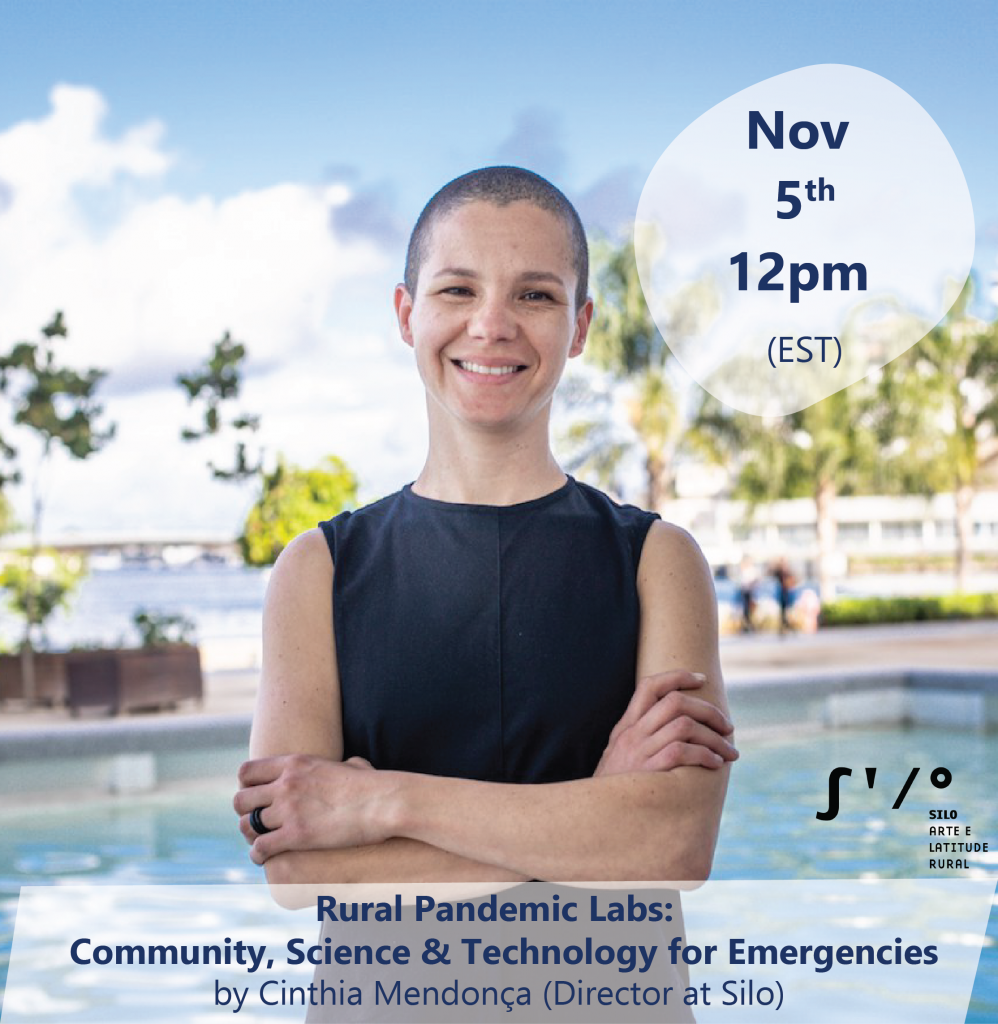Rural Pandemic Labs: Community, Science & Technology for Emergencies
November 5th, 12 – 1 pm (EST)
Speaker: Cinthia Mendonça, Silo – Art and Rural Latitude
Moderator: DCI Fellow Victoria Palacin
Event on Zoom: please register for link!
Note: This event will be in English and Spanish (translation provided).
Cinthia is the director of Silo (https://silo.org.br/en/). She lives in the Mantiqueira Mountains in Brasil. She is also an artist and researcher at the Federal University of Rio de Janeiro and the State University of Rio de Janeiro. Cinthia has been doing non-profit transdisciplinary work in rural communities since 2011. She has been recognized for her work by the SEGIB (Ibero-American General Secretariat) and serves in this institution as a mentor of LabIC – Citizens’ Innovation Laboratories.

Overview
In this talk, Cinthia will introduce the work of SILO – Art and Rural Latitude during the COVID-19 pandemic. SILO is a nonprofit organization dedicated to promote and spread art, science, and technology in rural areas and in environmental conservation units through immersive experiences and transdisciplinary practices. At its core Silo aims to promote the exchange between intuitive techniques and scientific knowledge. The organization uses different approaches to achieve its goals, such as residency programs, citizen labs, workshops, educational actions, and activities focused on the development of women, underrepresented minorities, and vulnerable populations. Silo is run by women who are committed to race and gender equality and the guarantee of sharing knowledge without harming vulnerable populations.
One of the ways SILO operationalizes the transdisciplinary exchange of knowledge is through Laboratories. A Laboratory produces different types of technologies, either linked to the technical or the social realm, taking in areas as diverse as engineering, economics, social sciences, art, and education, among many others. The laboratories are experimentation spaces in the intersection of popular, scientific, technical and artistic knowledge that are focused in creating solutions to real problems that are faced in the peripheries and the countryside. All that is lined up with the sustainable development goals established by the UN, contributing to the prosperity of producers, communities, and creators within these spheres.
During 2020, SILO has been running “Pandemic Labs” or “Emergency Labs”. These are virtual spaces for strategic development. During five days of remote work, people work on solutions to the complex problems their communities face due to the COVID – 19 pandemic. The unique feature of these laboratories is that they are born to act in peripheral spaces as opposed to big urban centers. They are made in and for the margins, with a special focus on the 3.6 billion people who do not have internet in this world. Hence they create online and offline, through ingenious computer support, collaborative infrastructures, and arrangements.
More about SILO:
Silo is located on the triple border of the Rio de Janeiro, Minas Gerais, and São Paulo states. The region (Serra da Mantiqueira and Vale do Rio Paraíba) is inhabited by 3.3 million people. There are rural areas, small towns, and peasant, indigenous, and Quilombola villages. Silo operates in this territory, however, its projects have a national and international scope. Silo is situated in an APA (environment protection area), with a territorial context in which rural areas and environment preservation units converge. APA is a category of preservation unit for sustainable use that can include private property and public lands where the local residents have direct citizen participation in the management. The goals of an APA are: to compatibilize human activity with the preservation of wildlife; to protect the forest resources; and to bring improvements to the quality of life of the population. The situation makes us think about pertinent questions and solutions to the climate crisis, pointing to the future where human and environmental development walk hand in hand and where ancestral and popular knowledge is as important as scientific knowledge.
This territorial context raises some questions that guide SILO’s work, such as: what are the ways of life that exist in this new social, cultural, and environmental context of the preservation units? How have those ways of life contributed toward solutions to the environmental crisis? How to include underrepresented minorities, and vulnerable populations as a priority in climate change decisions?
You can read more about the projects of SILO at https://silo.org.br/media/docs/Portfolio.pdf
